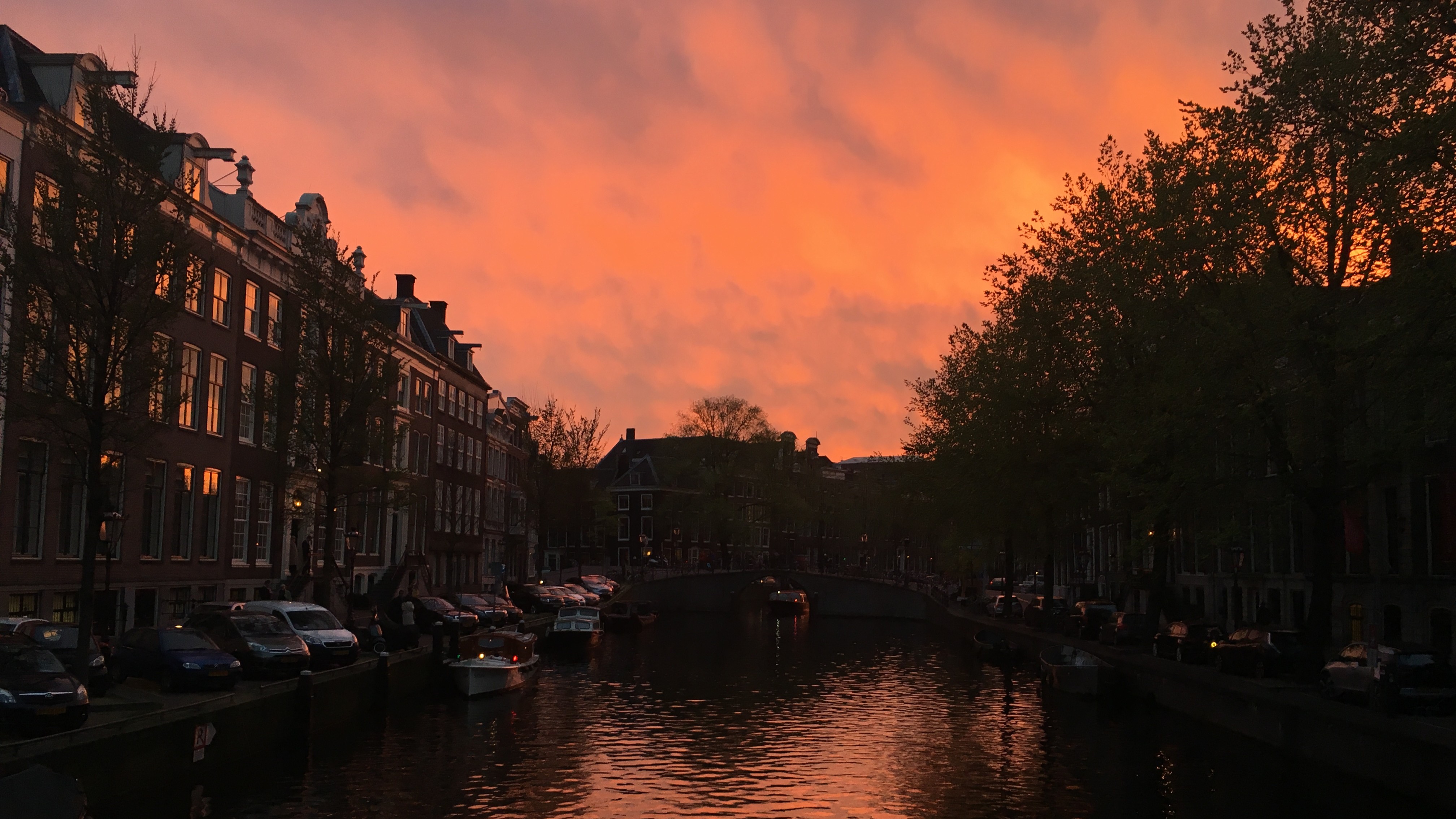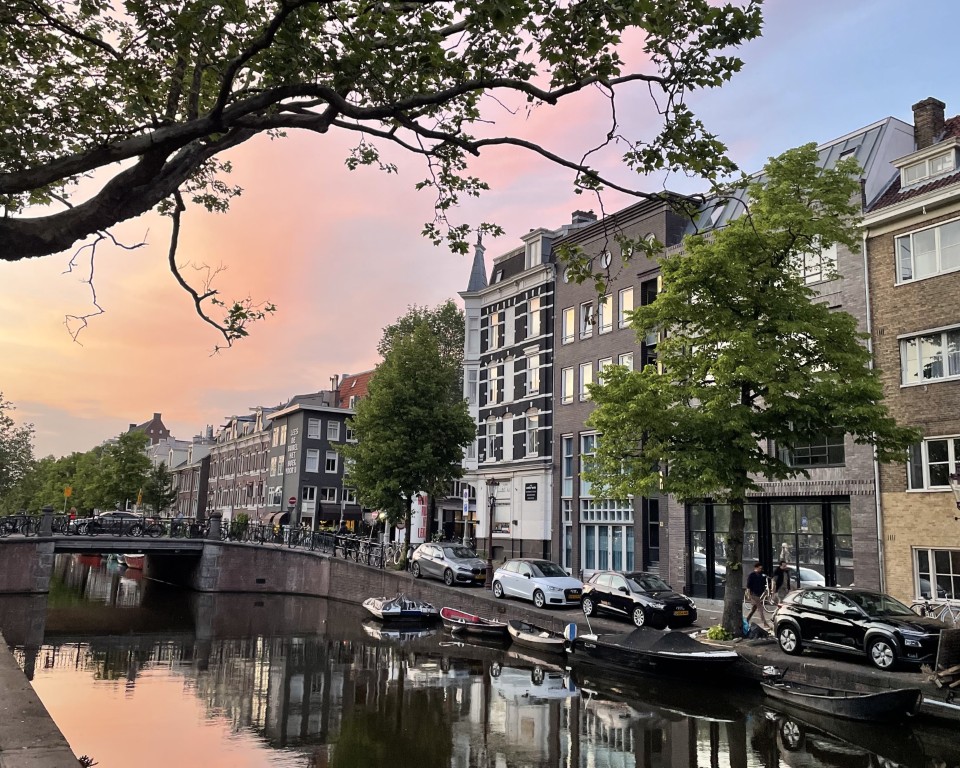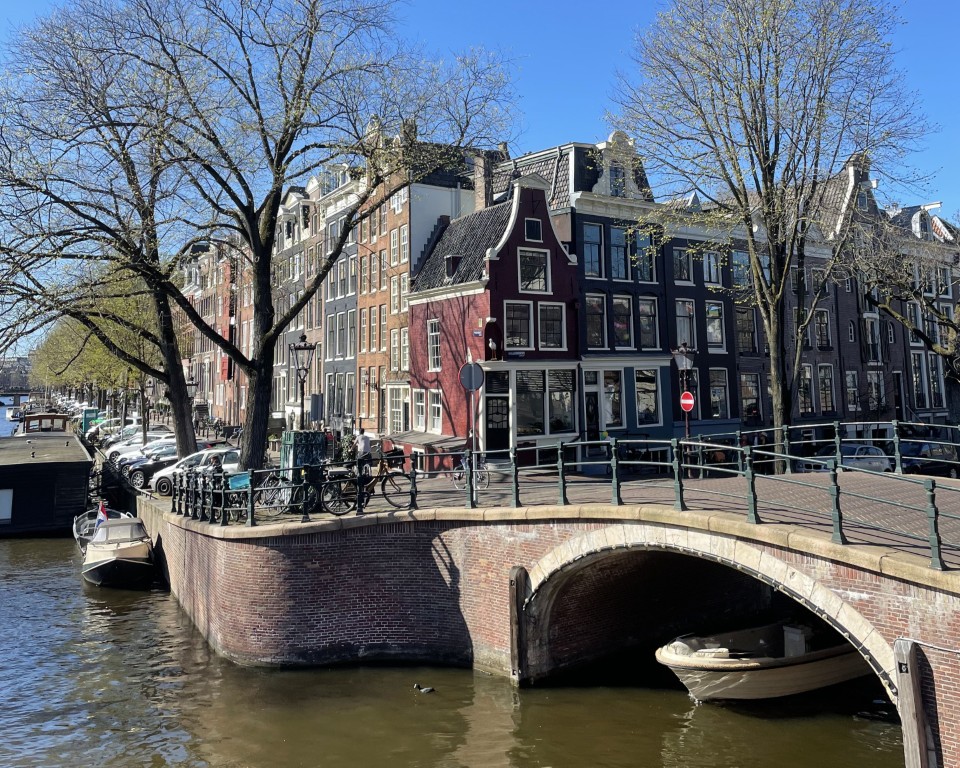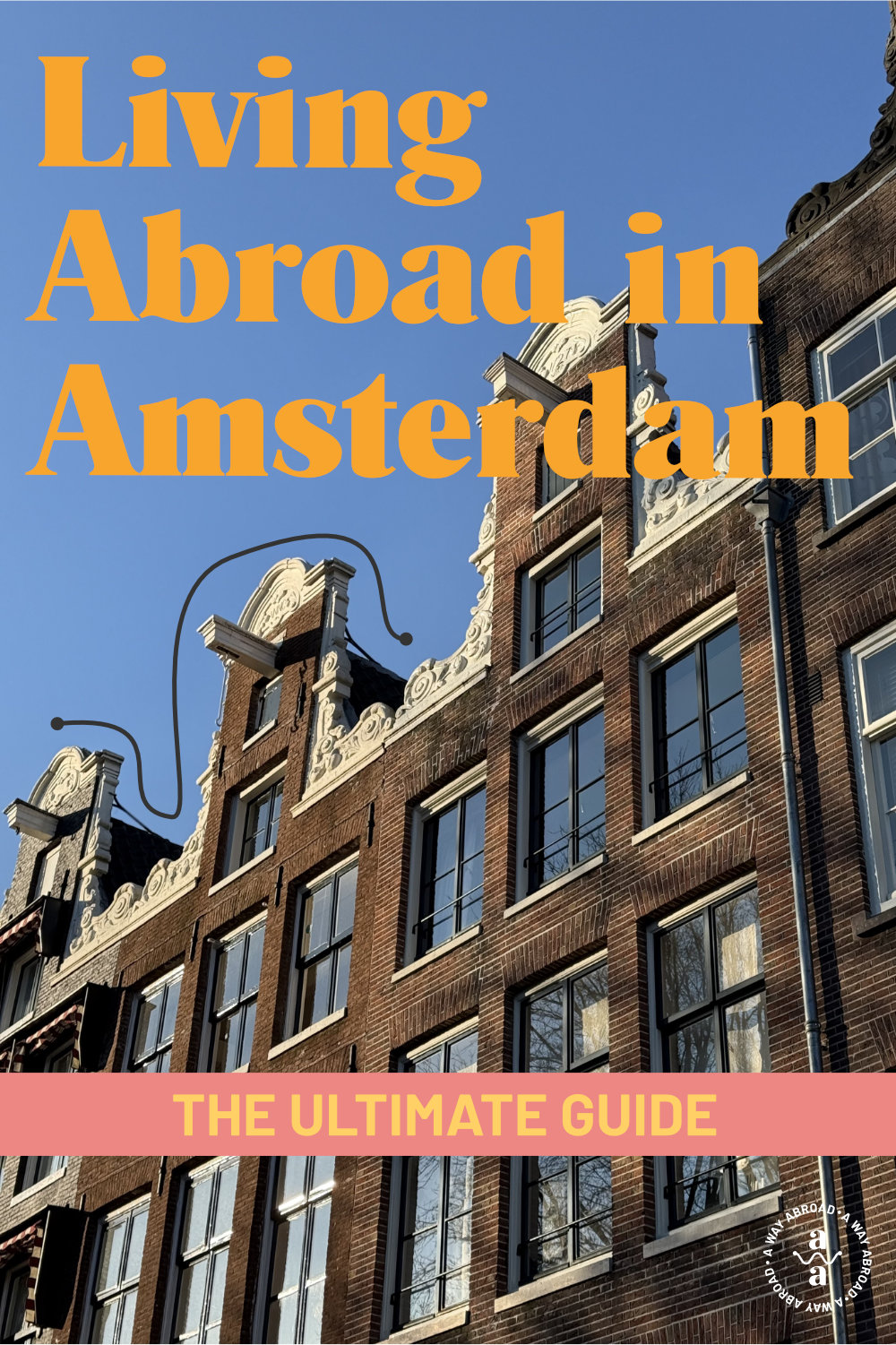Hallo! My name is Cristina, I’m from Italy and I live and work in Amsterdam. I chose Amsterdam for my Master's studies, and I fell so in love with this city that it became my permanent home. I've lived here for the past 10 years, and collected insights I'm happy to share if you are interested in moving abroad to the capital of the Netherlands.
So, if you're also considering moving to Amsterdam, let me guide you through the things you'll want to know to get settled.
Short on time? Here's the cheat sheet:
💭Living in Amsterdam is ideal for those seeking plenty of entertainment and things to do.
🏠In my opinion, the best areas to live in the city include: Jordaan, Noord, De Pijp, Westerpark, or Oost.
🛂Most non-European foreigners who move here are on a work visa, student visa, or au pair visa.
💰Cost of living is relatively low but consistently increasing. Earn travel rewards on all expenses with a Capital One Venture Card.
📞Save the hassle of getting a local SIM or the cost of roaming with Airolo, an e-SIM that’ll have you connected from the moment you arrive.
☂️Although the weather is unpredictable and the cost of living is high,
🏖️There's a fantastic international community and endless things to do.
Why I Love Living in Amsterdam
Amsterdam is one of the best choices when considering moving to a European capital city, for a few reasons.
It's Simply Fun
It has a lot to offer, whatever your interests are – be it art, music, sports, crafts, or food, there’s a space to cultivate every passion.
Expat life in Amsterdam is really fun: getting bored it’s almost impossible, given the cultural heart of the city and plenty of options for activities every week.
The people in Amsterdam, a blended mix of Dutchies and internationals, are mostly open-minded and liberal, creating an environment where everyone can truly be themselves.
It's Easy to Get Around
While it's the capital of the Netherlands, Amsterdam itself it's not a big city and you can get anywhere by bike.
There's also an excellent public transport system, making it easy to commute to other cities in the Netherlands and nearby Western Europe countries (for example, Brussels, Paris and London are connected by a direct train).
Schiphol Airport, located only 20 minutes from the city by train, is one of the best-connected airports in Europe, making travel everywhere in the world really easy and convenient.
It's Multicultural
Over recent years, Amsterdam has also become one of the world's most multicultural cities: its expat community is vibrant and diverse, which makes it easy for foreigners to connect and meet many expats alike.
This welcoming environment is also thanks to the widespread English proficiency: most Dutch people speak English perfectly, and it’s possible to find jobs that don't require learning Dutch but request other local languages.
However, if you plan to stay in the Netherlands long-term, learning Dutch is essential to fully integrate into society and access more work opportunities.
It Has a Great Work-Life Balance
In the Netherlands, work isn't everything - one of the best reasons to live in Amsterdam is the excellent work-life balance.
Working hours are typically between 09:00 to 17:30, allowing plenty of time to dedicate to your life outside of work and your passions.
Sport is a big one for most people in Amsterdam, with many locals being active and working out regularly. The city offers plenty of excellent quality options for a healthy lifestyle, from affordable gyms to fancy studios, and several communities like running or cycling clubs.
The Things I Don't Love
Not everywhere is perfect, so a few of the cons I've found in Amsterdam include...
It's Tough to Find Housing
This appealing expat culture presents another side of the coin - Amsterdam is facing a housing crisis, and finding an apartment or room it’s incredibly difficult and often involves skyrocketing prices, since overbidding is a popular practice for both renting and buying.
The Job Market Is Competitive
Also the job market is very competitive, considering the high demand from non-Dutch speaking candidates. However, Amsterdam is the home of a multitude of companies, from start-ups to multinationals, and it’s also relatively easy to work as a freelancer or open your own business here.
So even if challenging, there are job opportunities.
Costs in the Dutch Capital

Like in many other major European cities, the cost of living in Amsterdam has risen over the last years, making it one of the most expensive cities in Europe.
The salaries are higher, if compared to southern European countries, but the average costs are still quite high. You can find some examples of the basic average living costs below, keeping in mind that these are an indication, as they can vary depending on personal or external factors.
Not sold on living in Amsterdam? You might also be interested in Groningen, Utretch or Rotterdam.
Housing
Rent or mortgage will take the biggest chunk from your bank account: average rent for apartments (or rooms in shared apartments) outside the Amsterdam city centre might be a bit cheaper (1,300 - €2,000), while those in the city center will be significantly higher (€1,650 - €2,500, or even more for prime locations).
Besides the rent, utilities (water, gas, internet) can easily cost between 150-300€ a month.
Health System
In the Netherlands, health insurance is mandatory for all residents: this means that if you're moving to Amsterdam, you'll need to get Dutch basic health insurance.
A basic package (Basisverzekering) is around €150 - €160 per month. Some insurers may offer slightly cheaper options, especially if you opt for a higher voluntary deductible (eigen risico). However, it means you'll have to pay out of pocket if you incur in significant medical costs.
Groceries
The cost of groceries in Amsterdam can vary significantly based on shopping habits, dietary preferences, and where you choose to shop.
For a single person, expect to spend between €250 - €400 per month, and €400 - €600 per month if you’re a couple. The most popular supermarkets are Albert Heijn, Jumbo, Dirk, and, on the cheaper range, Lidl and Aldi.
Transportation
The public transportation system in the Netherlands functions very well and connects all areas of the city, but the most convenient (and local) way to get around is by bike, which allows you to save money as it requires minimal costs for maintenance after the initial purchase.
Recommended Areas to Live

Amsterdam it's not a huge city, and anything within the ring (which means the boundaries of the city) will allow you to move around the city easily. Below are the best areas to live in Amsterdam, in my opinion.
- Jordaan: centrally located and the most picturesque area of the city, with beautiful architecture and the signature canals. Location is perfect, but expect high rental prices and smaller apartments on average.
- De Pijp, Oud-West & Oud-Zuid: not technically in the centre but in great locations, with plenty of options for shops, bars, and restaurants. Especially in the areas close to Vondelpark and Museumkwartier, prices can skyrocket, but they're among the most beautiful areas of the city.
- Westerpark & Bos en Lommer: the western side of the city, slightly cheaper and with proximity to parks, with lots of local shops and cafes.
- Oost, Amstel, Rivierenbuurt: on the eastern side of the city, perfect for those who prefer a more tranquil lifestyle.
- Noord: A cool area dubbed as the "Brooklyn of Amsterdam", located on the opposite side of the water from the city. A locals' favourite with lots of options for going out, the best locations are the ones near the Buiksloterweg ferry station (which commutes 24/7 to Amsterdam Central Station).
Basic Visa Options

Applying for a visa for the Netherlands depends on your nationality.
If you are from the EU/EEA or Switzerland, you generally do not need a visa or a work permit. You can live and work freely, but if staying over four months, you must register with the municipality to obtain a citizen service number (BSN). This is how I was able to move from Italy to the Netherlands.
If you are from other countries in the world, you will likely need a residence permit and often a work permit to live and work in this new country. You usually need a Provisional Residence Permit (MVV) to enter, followed by a residence permit.
Generally, your employer acts as your sponsor and applies for you. On the website NetherlandsWorldwide it's possible to check all the requirements.
One of the easiest ways to move to the Netherlands is on their au pair visa. This is a great option for young people looking for a foot in the door. Plenty of others are able to move here to work in the floral industry - seriously!
In Short: Pros & Cons of moving to Amsterdam

To make it even easier, here's a quick look at my personal pros and cons to life in Amsterdam.
Pros
- Beautiful city, well-kept and with stunning architecture
- Easily connected to any part of Europe and the world
- Vibrant city with a lot to offer, from art galleries, music and amazing nightlife (if you’re into electronic music, this is your paradise)
- Summer in Amsterdam is truly magical
- A vibrant international expats community
- Great work-life balance
- Open-minded people
- Freedom to express yourself
- Easy to move around the city by bike
- Low crime rate and a safe city
- It's FUN and it's hard to get bored!
Cons
- The weather. You can have four seasons in one day, winters are cold, rainy and grey, and the wind it's the worst you'll ever experience
- Everything is really expensive, high cost of living
- Healthcare is expensive and sometimes difficult to be properly treated by doctors
- The housing market is challenging, difficult to find a place to live
- Competitive job market
- In the long run, you'll need to learn Dutch
What I Wish I Knew Before Moving Here

Navigating Dutch culture has been difficult at times. These are some of the cultural shocks I experienced when I moved to Amsterdam.
Dutch Directness
The Dutch are famous for being incredibly direct, in a way that can be perceived as rude in the beginning. Brace yourself for no-filter communication, both in work and personal situations.
Tikkie Culture
Dutchies can be quite… cautious with money, and offering to pay for your friends is not a thing here. It’s not uncommon to receive a Tikkie to pay back small expenses, like a coffee you shared with a friend.
What the heck is a Tikkie, you might ask? It’s the most popular app used by locals to transfer money, in the form of a request that you can easily share on WhatsApp or similar. Sometimes for ridiculously low amounts.
Your Calendar Is Your Best Friend
You can forget about being spontaneous: locals tend to have their weeks planned well in advance, and making plans last-minute it's often not possible. Expect to plan meticulously all of your appointments, including hangouts with friends!
Will You Move to Amsterdam?
Although I've faced my fair share of culture shocks and have to navigate the pros with the cons, I'm really happy living in Amsterdam. It's a fun city that'll never bore you - no matter how many years you call it home. Will you move here, too?









.png)
.png)